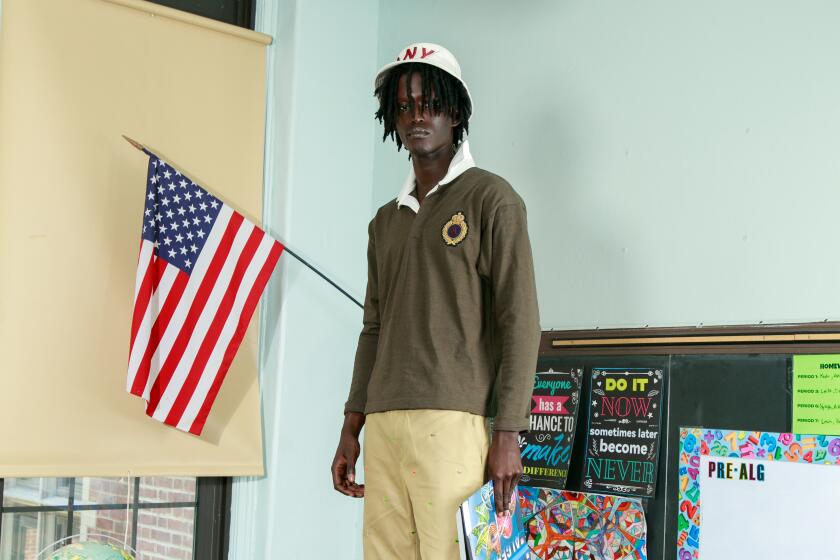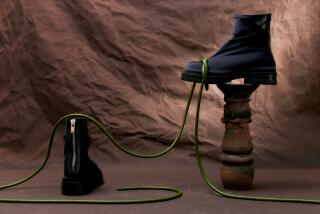- Share via

This story is part of Image’s October Luxury issue, exploring what luxury really means to artists, designers, aestheticians, architects and more.
I can think of nothing more luxurious than choice — the simple ability to dictate rather than be dictated to. We take for granted that we can pick from seven different brands of coffee makers or thousands of hours of filmed entertainment on a streaming service. I don’t even know how I picked my dry cleaner from the seven nearly identical locations within five minutes of my apartment. My dad would shame me at the grocery store when I refused to pick a breakfast cereal. “You know, kids in other countries have no choice. They have to eat gruel for every meal.” I was one of the millions of lucky kids in America who got to choose their cereal. And one of the unlucky millions who was made to feel bad about it.



Those grocery store conversations affected how I think about clothes. I appreciate options when it comes to style and fit, but I am hyper-aware that I only consider such things because I can afford to. Most people in Los Angeles will pull a garment off the rack and accept it as is. Maybe the waist is a little loose. Cinch it up with a belt. Maybe the hem on the pants is too long. Roll them up. Maybe the lining of the jacket is a weird color. Never, ever take it off in front of other people. Even alterations don’t offer relief from the feeling that nothing will ever be right about a certain garment.
I took an immaculate Fall/Winter 1995 Yohji Yamamoto suit with tags that I got from TheRealReal to Milt & Edie’s, the venerable 24-hour dry cleaner and tailor in Burbank, in the hope that I could get the trousers taken out. They were more than a bit too tight, and I hated the idea of wearing the jacket separately. There was plenty of fabric in the seat, and I even brought the extra fabric that came in one of the pockets. And yet, the woman who was assigned to be my tailor looked at me like I was crazy. “I need five inches of fabric and I have three at the most,” she said in an exasperated tone. “But I just want you to try,” I whined. Even a few extra inches of room would get me closer to the sartorial nirvana I was chasing. “Maybe I’ll lose weight,” I said, looking down at the ground like a kid who got caught peeing in the snow. She chuckled and said, “Yeah, maybe.” She promised to try her best and then sent me on my way, with an appointment to come back in a week and a half to retrieve my pants.
Chris Echevarria’s latest brand, Academy, puts a spin on “traditional American menswear.”
My relationship with clothes feels like a constant compromise: an acceptance that it will never quite be good enough and there will always be one or two things about any garment that will frustrate me. But for a price (a steep price), clothes can be perfect. They can be exactly what you want and nothing less. Bespoke and made-to-measure tailoring offer that glorious and burdensome luxury of choice — sometimes unlimited choice. The closest I have ever come to true bespoke perfection is two button-down shirts (one with a spread collar and one with a standard collar) I had done by Art Lewin Bespoke in downtown L.A. I have just enough room in both shirts, but not so much that they billow unnecessarily out of my pants.

I’ve talked about my relationship with Art before in these pages, and he is accommodating, polite and maybe a bit perplexed when I bring in old Prada suit jackets to be altered. I always get the sense that he thinks I have tons of relatives who keep dying. I didn’t take the Yohji pants to Art because I think of him as this deeply traditional man, with pictures of old soap opera stars in gray suits on his wall. Yohji is one of fashion’s great madmen and I wanted to take the trousers to someone who would look at it as a job and not a bizarre art piece. When the Milt & Edie’s tailor saw the pants, she shrugged and said, “Can I take out the pleats?” My response was abject horror at the thought of changing Yohji’s aesthetic choices, and to her credit she relented. I think she just wanted me out of her store at that point.
Having a bespoke shirt made is not quite as overwhelming as I imagine a full suit is, but it’s somewhere on the list. You get to choose a fabric, a collar, the buttons (or lack thereof if you are going for a formal look with studs) and monogramming. I have an insatiable addiction to putting my initials on everything, so I like to get my cuffs monogrammed. A tailor’s space almost always seems to have some kind of mystery brown liquor in an ornate bottle that I imagine is only for people who spend a certain amount of money. The liquor is probably great for making the decisions easier. With a buzz, I’m not going to spend 10 minutes debating fabric textures and wrinkle resistance.




The main event is always the measurement. If you stay at the same tailor, like I have, you only have to do this once, unless you have a guy who knows a guy (a doctor, hopefully) who can get you Ozempic. The first time I put my new bespoke shirt on was like a revelation. I’ve gotten lucky with a Uniqlo or J. Crew shirt since then, but nothing is quite like knowing a shirt was made just for you. The “second skin” line about bespoke is a cliché at this point, but it’s true. Getting dressed ceases to be a compromise. Now, it’s a joy — an affirmation of the “you” that you are right now.
Made-to-measure, bespoke’s second cousin, doesn’t have the same flash of creative madness that comes from being able to put a leopard-print lining in a suit jacket, but it also spares you the maniacal laundry list of choices that bespoke offers. Recently, I visited the Beverly Hills Prada store to try out its made-to-measure suiting program. I browsed sample books and touched fabric while sipping on an espresso. I knew I’d never be able to afford the service, but I still wanted to spend an hour pretending I could.
For around $5,000 (on the low end), you can get a Prada suit built off a preexisting pattern. Just like bespoke, you can choose from a variety of details — buttons, fabrics, patterns and monogramming. The sample books for monogram fonts at Prada all say “M.P.” for Miuccia Prada herself. Like those initials, everything in Prada’s made-to-measure service fits within the galaxy of Mrs. Prada and Raf Simons. The silhouettes are slim and traditionally European. You can get the trademark Prada badge sewed into the breast pocket of the shirts. It’s an option that fits the customer who wants to be ensconced in the world of Prada, while also giving them that luxury of choice. Some things simply cannot be done, because they’re not Prada things. Suit jackets can’t be too long. Pants can’t be too voluminous. In a way, made-to-measure is like the child safety lock on a car door. It prevents you from doing anything too foolish, while still freeing you of the compromise of the off-the-rack suit.



I finally made it back to Milt & Edie’s on a Wednesday. I wore the jacket of my Yohji suit with a pair of regular navy blue pants, an optimistic move to say the least. The clerk at the register handed me my trousers and I asked to try them on in the dressing room. I slowly pulled up the pants and went to lock the buttons in place. To my shock, each button fastened. A smidge tight, but the buttons successfully entered the holes. And more important, I could walk without ripping a hole down the middle. The tailor didn’t even need to use the extra fabric I gave her. “They’re perfect,” I said to anyone who looked my way. I even might have given a thumbs up or two as I walked out the door. I might feel like vacuum-sealed turkey when I wear these pants, but it’s a compromise I’m willing to make.

Production Monkeymind Productions
Model Caspen
Hair & makeup Berenz Castro
Styling assistant: Carmen Madera
Lighting assistant Jesse Zapatero
Location Projkt Studios







